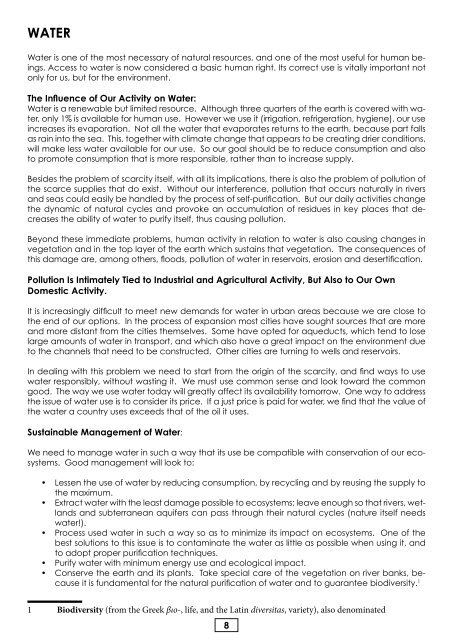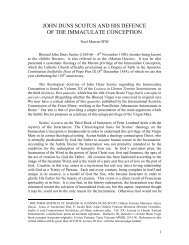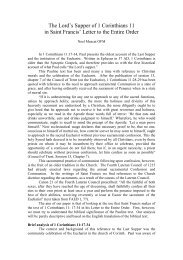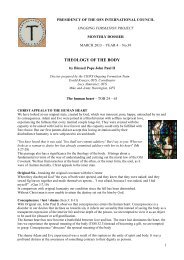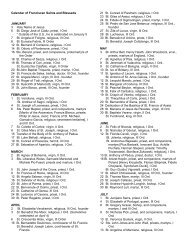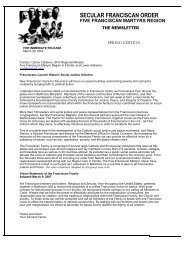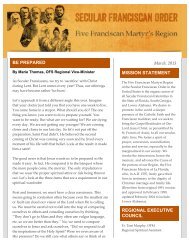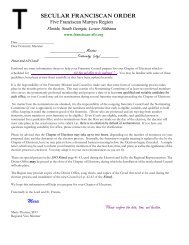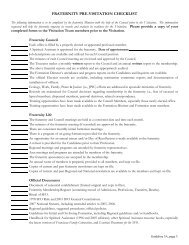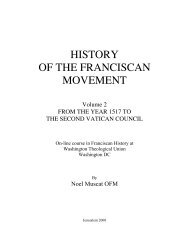Care for Creation in the Daily life of the friars Minor - OFM
Care for Creation in the Daily life of the friars Minor - OFM
Care for Creation in the Daily life of the friars Minor - OFM
You also want an ePaper? Increase the reach of your titles
YUMPU automatically turns print PDFs into web optimized ePapers that Google loves.
WATER<br />
Water is one <strong>of</strong> <strong>the</strong> most necessary <strong>of</strong> natural resources, and one <strong>of</strong> <strong>the</strong> most useful <strong>for</strong> human be<strong>in</strong>gs.<br />
Access to water is now considered a basic human right. Its correct use is vitally important not<br />
only <strong>for</strong> us, but <strong>for</strong> <strong>the</strong> environment.<br />
The Influence <strong>of</strong> Our Activity on Water:<br />
Water is a renewable but limited resource. Although three quarters <strong>of</strong> <strong>the</strong> earth is covered with water,<br />
only 1% is available <strong>for</strong> human use. However we use it (irrigation, refrigeration, hygiene), our use<br />
<strong>in</strong>creases its evaporation. Not all <strong>the</strong> water that evaporates returns to <strong>the</strong> earth, because part falls<br />
as ra<strong>in</strong> <strong>in</strong>to <strong>the</strong> sea. This, toge<strong>the</strong>r with climate change that appears to be creat<strong>in</strong>g drier conditions,<br />
will make less water available <strong>for</strong> our use. So our goal should be to reduce consumption and also<br />
to promote consumption that is more responsible, ra<strong>the</strong>r than to <strong>in</strong>crease supply.<br />
Besides <strong>the</strong> problem <strong>of</strong> scarcity itself, with all its implications, <strong>the</strong>re is also <strong>the</strong> problem <strong>of</strong> pollution <strong>of</strong><br />
<strong>the</strong> scarce supplies that do exist. Without our <strong>in</strong>terference, pollution that occurs naturally <strong>in</strong> rivers<br />
and seas could easily be handled by <strong>the</strong> process <strong>of</strong> self-purification. But our daily activities change<br />
<strong>the</strong> dynamic <strong>of</strong> natural cycles and provoke an accumulation <strong>of</strong> residues <strong>in</strong> key places that decreases<br />
<strong>the</strong> ability <strong>of</strong> water to purify itself, thus caus<strong>in</strong>g pollution.<br />
Beyond <strong>the</strong>se immediate problems, human activity <strong>in</strong> relation to water is also caus<strong>in</strong>g changes <strong>in</strong><br />
vegetation and <strong>in</strong> <strong>the</strong> top layer <strong>of</strong> <strong>the</strong> earth which susta<strong>in</strong>s that vegetation. The consequences <strong>of</strong><br />
this damage are, among o<strong>the</strong>rs, floods, pollution <strong>of</strong> water <strong>in</strong> reservoirs, erosion and desertification.<br />
Pollution Is Intimately Tied to Industrial and Agricultural Activity, But Also to Our Own<br />
Domestic Activity.<br />
It is <strong>in</strong>creas<strong>in</strong>gly difficult to meet new demands <strong>for</strong> water <strong>in</strong> urban areas because we are close to<br />
<strong>the</strong> end <strong>of</strong> our options. In <strong>the</strong> process <strong>of</strong> expansion most cities have sought sources that are more<br />
and more distant from <strong>the</strong> cities <strong>the</strong>mselves. Some have opted <strong>for</strong> aqueducts, which tend to lose<br />
large amounts <strong>of</strong> water <strong>in</strong> transport, and which also have a great impact on <strong>the</strong> environment due<br />
to <strong>the</strong> channels that need to be constructed. O<strong>the</strong>r cities are turn<strong>in</strong>g to wells and reservoirs.<br />
In deal<strong>in</strong>g with this problem we need to start from <strong>the</strong> orig<strong>in</strong> <strong>of</strong> <strong>the</strong> scarcity, and f<strong>in</strong>d ways to use<br />
water responsibly, without wast<strong>in</strong>g it. We must use common sense and look toward <strong>the</strong> common<br />
good. The way we use water today will greatly affect its availability tomorrow. One way to address<br />
<strong>the</strong> issue <strong>of</strong> water use is to consider its price. If a just price is paid <strong>for</strong> water, we f<strong>in</strong>d that <strong>the</strong> value <strong>of</strong><br />
<strong>the</strong> water a country uses exceeds that <strong>of</strong> <strong>the</strong> oil it uses.<br />
Susta<strong>in</strong>able Management <strong>of</strong> Water:<br />
We need to manage water <strong>in</strong> such a way that its use be compatible with conservation <strong>of</strong> our ecosystems.<br />
Good management will look to:<br />
• Lessen <strong>the</strong> use <strong>of</strong> water by reduc<strong>in</strong>g consumption, by recycl<strong>in</strong>g and by reus<strong>in</strong>g <strong>the</strong> supply to<br />
<strong>the</strong> maximum.<br />
• Extract water with <strong>the</strong> least damage possible to ecosystems; leave enough so that rivers, wetlands<br />
and subterranean aquifers can pass through <strong>the</strong>ir natural cycles (nature itself needs<br />
water!).<br />
• Process used water <strong>in</strong> such a way so as to m<strong>in</strong>imize its impact on ecosystems. One <strong>of</strong> <strong>the</strong><br />
best solutions to this issue is to contam<strong>in</strong>ate <strong>the</strong> water as little as possible when us<strong>in</strong>g it, and<br />
to adopt proper purification techniques.<br />
• Purify water with m<strong>in</strong>imum energy use and ecological impact.<br />
• Conserve <strong>the</strong> earth and its plants. Take special care <strong>of</strong> <strong>the</strong> vegetation on river banks, because<br />
it is fundamental <strong>for</strong> <strong>the</strong> natural purification <strong>of</strong> water and to guarantee biodiversity. 1<br />
1 Biodiversity (from <strong>the</strong> Greek βιο-, <strong>life</strong>, and <strong>the</strong> Lat<strong>in</strong> diversitas, variety), also denom<strong>in</strong>ated<br />
8


